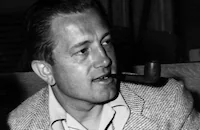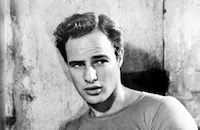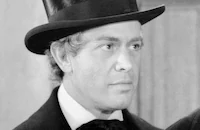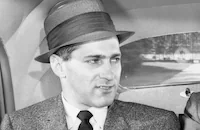The Young Lions

Brief Synopsis
Cast & Crew
Edward Dmytryk
Marlon Brando
Montgomery Clift
Dean Martin
Hope Lange
Barbara Rush
Film Details
Technical Specs

Synopsis
On New Year's Eve, 1938, Christian Diestl, a Bavarian shoemaker and part-time ski instructor, is romancing American Margaret Freemantle at a party. When Margaret asks Christian if he is a Nazi party member, he replies that he is not at all political but believes that the Nazis stand for something hopeful in Germany. He explains that he had to abandon his medical studies due to the lack of free universities in Germany, and that Hitler has promised to change that. Margaret is dismayed by Christian's affiliation and leaves the party early. World War II begins, and on 24 Jun 1940, when France surrenders to Germany, Christian, now a Nazi lieutenant, reports to Captain Hardenburg on the steps of Sacre Coeur in Paris.
In New York, singer Michael Whiteacre, hoping to be exempted from army service, is examined by the draft board and told to report for induction in about three months' time. At the draft board, Michael meets Noah Ackerman, who has recently arrived in New York from California. Michael invites Noah to a party that evening where he meets Margaret, now Michael's girlfriend, and is introduced to Hope Plowman, who is from Vermont. Noah escorts Hope to her temporary home in Brooklyn and instantly falls in love with her. In Paris, Christian's fellow officer Brandt has arranged a blind date for him with Françoise, a friend of the French woman, Simone, he is seeing. Although Françoise at first asks Christian how many Frenchmen he has killed, she later apologizes, explaining that her husband was killed in Belgium. Christian walks her home and asks to see her again. In Vermont, Hope nervously introduces Noah to her father, having told him beforehand that Noah is Jewish. Mr. Plowman and Noah walk around the small town, steeped in Puritan tradition, and as they return to Hope, Mr. Plowman tells Noah that he has never known a Jew and agrees to their marriage. In Paris, Christian asks for a transfer as he dislikes having been assigned to round up children for labor duties and is beginning to doubt his country's purpose. Hardenburg gives Christian leave to go to Berlin and asks him to deliver a present to his wife Gretchen. Gretchen seduces Christian and tells him that she knows someone on Rommel's staff who can arrange a transfer of duty.
In New York, Michael has been unable to pull any strings to keep himself out of the army and must report for basic training. Margaret, who is working for the Office of War Information, is being posted overseas and wants to get married, but Michael is unwilling. The next day, Noah leaves Hope to report to the army. In North Africa, Christian and Hardenburg execute a dawn raid on an encampment of British soldiers. Hardenburg carries the attack to excess, and orders all the wounded to be killed, but Christian finds himself unable to follow that order. Noah and Michael end up in the same army platoon, where Noah is subjected to harassment by Captain Colclough, who makes him the scapegoat for the confinement of the entire platoon to the barracks for a weekend. The other soldiers try to intimidate Noah with veiled ethnic slurs. Later, when Noah discovers that money he has been saving for a birthday present for Hope has been stolen from his footlocker, he issues a challenge to the unknown thief to fight him, and when four of the largest men in the platoon admit to the theft, Noah asks Michael to be his second. When Michael reports to Capt. Colclough that Noah has been badly beaten in three fights and asks him to put a stop to it, the captain warns Michael that he has been instructed by the colonel to approve or disapprove a request to have him transferred to Special Services in London, but should he complain to the colonel about Noah's treatment, the transfer will not go through. The transfer papers come in, but Michael elects not to leave as Noah still has one more fight. Noah wins that one and then goes A.W.O.L.
In North Africa, the German troops are attacked by British and American forces, but Christian and Hardenburg escape on a motorcycle. After Christian tells him that he is sick of the "great German army," Hardenburg replies that he should have shot him earlier when he disobeyed a command. The motorcycle hits a land mine. In America, a pregnant Hope visits Noah in army detention and tells him that a lawyer has indicated to her that if he returns to his old company, he will not go to prison. Noah goes back and faces the wrath of Colclough, who fully expects to continue his persecution of Noah; however, the colonel informs him that he will be court-martialed for his actions against Noah and Michael. Noah's fellow soldiers welcome him back and present him with a copy of James Joyce's Ulysses , which Colclough had confiscated, and inside it, the money he lost. Christian, now a captain, visits Hardenburg in a hospital and finds him with his head totally bandaged. Hardenburg asks him to visit Gretchen again to reassure her that he is "salvageable." He also asks Christian to bring him a bayonet with which to kill a fellow patient, who is beyond hope and wants to die. In Berlin, before visiting Gretchen, Christian witnesses the devastation and misery of the city. Gretchen tells him that her husband has killed himself with a bayonet, adding that she had written to him telling him not to return, that he would be better off in a permanent veterans' hospital. When Gretchen propositions him, Christian pushes her away in disgust and leaves. Christian meets Brandt again and they drive back to Paris to meet Simone and Françoise. Brandt tells Christian that Germany has lost the war and that he intends to desert. Christian tells Françoise that the thought of seeing her again kept him going through the horrors he has witnessed. She urges him to desert, but during the night he leaves a farewell note to her, "Forgive me, I love you but I am a German soldier."
In London, Michael and Margaret are together in a club during an air raid. Michael has turned down promotions, choosing to remain a private, but feeling guilt about having Noah and the others do his fighting for him, decides to return to his old company, now fighting in Normandy. He tells Margaret they will get married upon his return. In Vermont, Hope, now the mother of a baby girl, receives a letter from Noah promising to return to them. In Normandy, when they are pinned down by enemy fire, Noah, with Michael's help, rescues several of the men who had fought him. In Germany, when the retreating convoy with which Christian is now fighting is strafed by a plane, he wanders away and comes upon the Nackerholtz concentration camp. The camp's commander complains to him about the difficulties of running such a camp and receives orders, by phone, to kill every man, woman and child in the camp, 6,000 people, before the American troops arrive. The commandant encourages Christian to face the enemy when they arrive, doing his duty for the fatherland, but Christian wanders on very distraught and despairing. Noah and Michael's company liberate the camp and bring the local mayor to witness the horror therein. A rabbi, a former prisoner, asks permission of the company's captain to hold a religious service in the camp, and the captain guarantees that he can, over the protests of the mayor who states that this will cause riots. Noah and Michael are walking in the woods around the camp when the sound of Christian destroying his machine gun against a tree stump attracts them. As Christian walks toward them, Michael shoots and kills him. The war ends and Noah returns to New York to Hope and his daughter.

Director

Edward Dmytryk
Cast

Marlon Brando

Montgomery Clift

Dean Martin

Hope Lange

Barbara Rush
May Britt

Maximilian Schell
Dora Doll

Lee Van Cleef
Liliane Montevecchi

Parley Baer

Arthur Franz
Hal Baylor
Richard Gardner
Herbert Rudley
John Alderson
Sam Gilman
L. Q. Jones
Julian Burton
Ashley Cowan

Vaughn Taylor
Gene Roth
Milton Frome
Harry Ellerbe
Craig Karr
Michael Smith
George Meader
Voltaire Perkins
Ann Daniels
Alberto Morin

Robert Burton
Ann Codee
Mary Pierce
Christian Pasques
Alfred Tonkel
Doris Wiss
John Gabriel
Stan Kamber
Ed Rickard
Joan Douglas

Harvey Stephens
Paul Comi
Michael Pataki
Stephen Bekassy
Ivan Triesault
Otto Reichow
Clive Morgan
Kurt Katch

Robert Ellenstein
John Bonner
Jeffrey Sayre
Joe Brooks
Henry Rowland
Nicholas King
Art Reichle
David Dabov
Lee Winter
Norbert Schiller
Hubert Kerns
Crew
L. B. Abbott
Buddy Adler
Edward Anhalt
Adele Balkan
Alfred Bruzlin
Ben Chapman
Lt. Col Allison A. Conrad
Warren B. Delaplain
Carl Faulkner
Don Flick
Ralph Freed
Hugo Friedhofer
Addison Hehr
Burton Lane
Charles Lemaire
Al Lichtman
Joe Macdonald
Lionel Newman
Ben Nye
Edward B. Powell
Stuart A. Reiss
Ad Schaumer
Walter M. Scott
Dorothy Spencer
Helen Turpin
Lyle R. Wheeler
Saul Wurtzel

Videos
Movie Clip





Trailer
Hosted Intro
Film Details
Technical Specs

Award Nominations
Best Cinematography
Best Score
Best Sound
Articles
The Young Lions
Getting The Young Lions to the screen took almost ten years and the talents involved each had their own reasons for wanting it to be a success but, in the end, only one enjoyed such luck, Dean Martin. For the others, it proved a disappointment and for one, Montgomery Clift, it became impossible to overcome.
Its director, Edward Dmytryk, wanted the film to be a success after the relative failure of his previous effort, Raintree County (1957), which had brought in decent box office but suffered from tepid to bad reviews. Dmytryk's career was broken up into two halves, one before the Red Scare and Congressional hearings on communism, and one after. He had been a member of the original Hollywood Ten, a group of writers and directors sent to jail for contempt of congress for failing to comply with the requests of the hearings. After a few months in jail, Dmytryk went to England and continued directing but longed to return to studio backing in America. In the early fifties, he got his chance. He returned to the states and got his old job back by going before congress and naming over twenty names of suspected Hollywood communists. It didn't make him very popular in the movie community but he got his old directing job back.
What's interesting with the casting of The Young Lions is that it seems everyone was in one form of transition or another. Marlon Brando had won Oscar gold four years earlier for On the Waterfront (1954) but had seen his box office success drop as well as his nominations for Best Actor (from 1951 to 1954, Brando was nominated four out of four years but from 1955 to 1958, he had but one, for Sayonara, 1957). The Young Lions might revive an already lagging career, he hoped, but, alas, it did not. Brando would then move into the second part of his career, drifting through the sixties until cementing his reputation as an actor once again in 1972 with The Godfather.
Montgomery Clift was also in transition and it was, indeed, the most painful of all. In the middle of filming Raintree County with Dmytryk at the helm, he suffered terrible injuries to his face in a car accident. After extensive reconstructive surgery, he went back to filming but at the premiere, audience members could tell which scenes were filmed before the crash and which were filmed after and Clift knew it. He even remarked to Dmytryk that his facial reconstruction would be the whole reason people would come see the movie. With The Young Lions, Clift was hoping for a major comeback. In fact, he talked among friends of possibly winning an Oscar for his portrayal of Noah Ackerman, one of the two American soldiers in the story, a Jew fighting anti-Semitism in his army unit. He was proud of his performance and the movie as well but when it opened, people were shocked to see Clift. Emaciated and gaunt, he looked like a shadow of his former self. Addiction to alcohol and pain killers were mainly responsible for his appearance.
Dean Martin played the second American, Michael Whiteacre, a pampered Broadway star who tries to avoid the draft, finally accepting defeat and fighting with the Army. Martin was entering a second phase of his career as well. After splitting from Jerry Lewis and their skit show, Martin was thrilled to get a chance with a straight dramatic part to show what he could do (and he only got it because the studio changed its mind and decided their first choice, Tony Randall, wasn't right for the part after all). It worked and Dean Martin went on to many more successful films, including an important role in Howard Hawks' Rio Bravo (1959) which, it turns out, was turned down by Montgomery Clift.
The film adaptation of The Young Lions turned out very well and both critics and audience generally liked it. Still, it didn't bring back Dmytryk, Brando or Clift from the increasingly uneventful second half of their respective careers. Dmytryk had a few more hits, including the excellent Mirage with Gregory Peck in 1965, but never fully produced movies as good as his pre-Hollywood Ten years. Brando and Clift were no longer big box office draws, though Brando would get a third act and a second Oscar thanks to The Godfather fourteen years later. Only Martin seemed to walk away with a net gain from the experience. Clift was depressed and reminded friends of his bitter disappointment with the outcome. Eight years later, he died of a heart attack but left behind a vast resource of excellent films from which to view his talents, including The Young Lions. It may not have worked out the way Clift wanted it to but, in the end, the legacy remains and The Young Lions holds up. It contains excellent performances and a well-crafted, intelligent and moving story. What more can one ask of a movie?
By Greg Ferrara
Click here to visit the TCM shop if you would like to purchase this DVD.
Producer: Al Lichtman Director: Edward Dmytryk Writer: Edward Anhalt Original Music: Hugo Friedhofer Cinematography: Joseph MacDonald Film Editing: Dorothy Spencer Art Direction: Addison Hehr, Lyle R. Wheeler Costume Design: Adele Balkan Cast: Marlon Brando (Lt. Christian Diestl), Montgomery Clift (Noah Ackerman), Dean Martin (Michael Whiteacre), Hope Lange (Hope Plowman), Barbara Rush (Margaret Freemantle), May Britt (Gretchen Hardenberg), Maximilian Schell (Capt. Hardenberg), Dora Doll (Simone), Lee Van Cleef (1st Sgt. Rickett)
SOURCES: Wikipedia IMDB The Independent. July 03, 1999. p. 1, Arts and Entertainment The New York Times. July 24, 1966. p. 61, Sunday Page.

The Young Lions
Quotes
Look, I've read all the books. I know that in 10 years we'll be bosom friends with the Germans and the Japanese. Then I'll be pretty annoyed that I was killed.- Michael Whiteacre
Trivia
Notes
A New York Times news item of March 3, 1952 reported that director Fred Zinnemann was about to option the film rights for the best-seller The Young Lions, which he intended to produce and direct independently. The item also stated that Zinnemann had made overtures to Marlon Brando and Montgomery Clift, with whom he had previously worked, to play two of the leading roles. However, on January 23, 1954, New York Times announced that producers Jacques Braunstein and Robert Lord had purchased the film rights for a sum in excess of $100,000. On January 25, 1954, Film Daily reported that Irwin Shaw was to receive a percentage of the profits and would write the screenplay. An September 11, 1955 New York Times news item indicated that Braunstein and Lord would produce Shaw's screenplay for United Artists release.
According to documents in the Twentieth Century-Fox Records of the Legal Department at the UCLA Arts-Special Collections Library, in December 1956, the studio acquired the rights to the novel from Braunstein for $50,000, plus 15% of the net profits. Additionally, Shaw was to receive $65,000 spread over ten years. The Twentieth Century-Fox Produced Scripts Collection, also at the UCLA Arts-Special Collections Library, contains a copy of Shaw's undated screenplay. All of the Twentieth Century-Fox drafts were written by Edward Anhalt. A September 1957 Hollywood Reporter news item adds that Joanne Woodward was intially cast as "Hope Plowman," but left the production to appear in The Long Hot Summer. An early June 1957 Hollywood Reporter production chart that preceded the start of production places Tony Randall in the cast, but he does not appear in the released film. An early November 1957 Hollywood Reporter production chart adds Ken Scott, John Gabriel and Gil Lasky to the cast, but their appearance in the released film has not been confirmed.
Filming began in France and Germany in June 1957 on a budget of $2,625,700. According to a studio press release, the Struthof concentration camp near Strasbourg, which the French had preserved just as they found it, was used as a location. When the studio ran advertisements in Strasbourg newspapers for "200 very thin, emaciated men," it found that 28 of the applicants were former inmates of Struthof. The North African desert scenes were shot at Borrego Springs, CA, supplemented by footage from the 1943 British documentary Desert Victory. The final confrontation, the only scene including the three principals, was filmed near Mt. Wilson, CA. By the time filming was completed in late Oct, the cost had risen to $3,553,245. Two sequences paralleling that between "Christian" and "Margaret" on New Year's Eve 1938, were shot but deleted in editing: The sequence with "Michael" was set in a New York nightclub, while the sequence in which "Noah" watched the father he had neither known nor liked very much, die, took place in a cheap hotel in Santa Monica, CA. "Noah's" father was played by noted Jewish stage actor Jacob Ben-Ami, making what would have been his Hollywood debut at the urging of Montgomery Clift, an old friend and admirer.
When the film opened, a good deal of criticism was leveled at the change from novel to film in the Christian character. In Shaw's novel, he was a hard-core, unregenerate Nazi, but the film presents him as a misguided "idealist" who eventually realizes the evil of the cause to which he has dedicated himself. In a May 15, 1957 memo to the producer, director and screenwriter, executive producer Buddy Adler wrote, "We need one good strong German character to speak for the German people as a whole, and to cast the guilt on the Nazis as opposed to the entire German population. A good picture today can take a million dollars out of Germany, and I am sure that unless we do something as suggested in the foregoing, this picture will not be sympathetically received in Germany."
In a April 14, 1958 Life feature on the film, it was reported that Brando delivered a fifteen-hour lecture to Dmytryk, Lichtman and Anhalt in which he gave a detailed analysis of Christian Diestl's character to convince them to make changes. Dmytryk, in a March 17, 1978 interview, stated, "I never spent 15 hours with Marlon.... The writer, Anhalt, and I already had these ideas about the character, and explained them to Marlon." The changes in Diestl's character enraged Shaw, who, quoted in a biography of Shaw, said that Brando "played him in a sympathetic way because he wants to be sympathetic on screen." The issue of anti-Semitism, which loomed large in the novel, was diminished in the film. Adler, in the May 15, 1957 memo, in which he reacted to a draft in which the anti-Semitism was considerably less subtle, wrote, "I also recommend that in the scene in the barracks in which Noah is called 'Jew-boy,' the connotation here should not be that the bullies and the captain dislike Noah because he is a Jew, but because he is sensitive etc.... The bullies are angry with Noah not because he is Jewish, but because the whole company is being punished because Noah failed in his duty to keep the windows clean." Critics also complained about loose ends and structural problems in the screenplay. However, Dmytryk has stated that he considers the film to be one of the best he made.
Producer Al Lichtman, longtime executive producer at MGM and former head of distribution for Twentieth Century-Fox, returned from a retirement due to health problems to produce the film, but died before it opened. This was Dean Martin's first dramatic role; his character's surname in the novel is "Whitacre," but was changed to "Whiteacre" for the film. Studio records indicate that Peter Brocco appeared in a deleted sequence. The Call Bureau Cast Service lists Wade Cagle, Kendall Scott, Anne Stebbins and Ann Paige as cast members but their appearance in the released film has not been confirmed. The film received Academy Award nominations in the Cinematography (Black-and-White), Sound Recording, and Music (Music Score of a Dramatic or Comedy Picture) categories.

Miscellaneous Notes
Released in United States Spring April 1958
CinemaScope
Released in United States Spring April 1958















